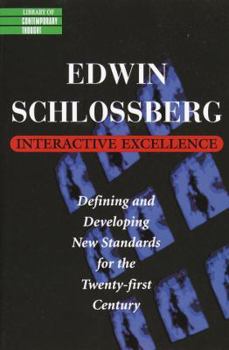Interactive Excellence: Defining and Developing New Standards for the Twenty-First Century
Select Format
Select Condition 
Book Overview
Examines how the changing nature of arts audiences has created the need to establish new standards of quality for artistic works. This description may be from another edition of this product.
Format:Paperback
Language:English
ISBN:0345423712
ISBN13:9780345423719
Release Date:July 1998
Publisher:Ballantine Books
Length:112 Pages
Weight:0.30 lbs.
Dimensions:0.3" x 5.5" x 8.3"
Customer Reviews
4 ratings
Dumbing down our society
Published by Thriftbooks.com User , 24 years ago
One of the great features of America is its ability to express the great cultural icons of the past in terms that the layman can understand and appreciate, a skill that ranges from Walt Disney's `Fantasia' to the more recent Jerry Springer show. Edwin Schlossberg is a fan of Springer, not Fantasia. Springer, after all, offers classic Shakespearean themes of love, hate, betrayal, revenge and triumph in the form of risque snippets about real people edited into a highly profitable 47 or so minutes. He's got all of the elements of Shakespeare, except he crams them into a bleeped-out version of what used to be called "tabloid trash." For the average viewer, the essence of a Springer show is, "See, some people are dumber than you." It's the same formula supermarket tabloids use, reassuring their readers that the rich and famous led lives that are as miserable or worse than any reader. Misery loves company, and stupidity loves a crowd. Both vastly outnumber the elites of society. Schlossberg is popular and powerfully influential. He knows how to draw a crowd. Forget about intellect, his emphasis is the creation of empty fun. He appeals to museums that want thousands of admission fees, but don't care whether the patrons learn a thing. Life is no longer about education, it's about playing little games in a setting that offers absolutely no danger of intellectual exercise. He is an astute, engaging and perceptive writer; the opening chapters of his book dissect the impact of new technology upon old culture. Then, his analysis falls apart; instead of educating people to appreciate the quality of excellence, he pretends the Beatles equal Bach, Beethoven and Brahms. A generation ago, the Beatles might have been the first step on the road to musical knowledge; today, people such as Schlossberg thinks that's as much as anyone needs to learn. The result, in the media, in museums, in symphony orchestras, in dramatic theater, is a dumbing down of content. His goal isn't to uplift the masses to a new level of excellence; instead, it's telling people there's great merit in the lowest common denominator. He's very successful at it; he founded a company called `Edwin Schlossberg Inc.' that advises cultural institutions how to reach the masses. To use a sports metaphor, his approach isn't to offer a finely tuned discussion on the physics of the curve ball; instead, he says if you play and understand sandlot ball, you'll have a better appreciation of major league baseball. He may be right. For too long, the social elites looked down their noses at anyone with a lesser understanding of high culture; Schlossberg is an expert at discovering the simplest elements of culture and using theme to explain overall themes. No one can pretend the old methods succeeded; leaving the failures of the past behind, Schlossberg explains how the twenty-first century will build a new cultural awareness from the ground up. Ther
How interactive design helps people make choices
Published by Thriftbooks.com User , 25 years ago
Shlossberg's book, at first a bit ethereal, comes solidly down to earth in the last third, where he describes the interactive exhibits he has created in his quest to educate the masses to make sophisticated choices. The Chicago Symphony Orchestra, for example, faced with an indifferent public and declining audience, turn to Schlossberg for assistance. Drawing inspiration from Indonesian shadow-puppet theatre, in which the audience not only watches from their seats in front, but over the course of the play wander backstage to check out the puppet masters and the props, Schlossberg devises an exhibit which will bring people "backstage" to the creative process of music making. The CSO project encourages visitors to compose their own bits of music electronically, then join these fragments with others to make up a virtual orchestra, thereby making the audience creators of their own symphony. The experience of working through this exhibit, Schlossberg believes, will give neophytes the critical skills and knowledge needed to enjoy what had been unfamiliar and difficult music.
It clearly defines audience issues in our changing culture.
Published by Thriftbooks.com User , 25 years ago
As a visual artist exploring issues of interactive work, I was very excited to come across Schlossberg's book which solidified for me many of the contemporary cultural ideas I had already been considering. My only complaint would be that the concrete solutions given apply mostly to musuems (the author's own work) while he continues to point out what a huge role television and the internet play in creating the current audience. I was glad to hear about the author's application of his ideas. I am, however, left wondering what concrete solutions could be applied to the televion and internet situation? It is a good "think" piece.
Right on target. Stimulating ideas. Quick and easy read.
Published by Thriftbooks.com User , 26 years ago
Schlossberg concisely brings together numerous fruitful ideas that can be useful for any institution that is dealing with understanding and empowering their audience. Museums will find it particularly useful. He starts to pitch his own consulting group, though, which was a turn off.






